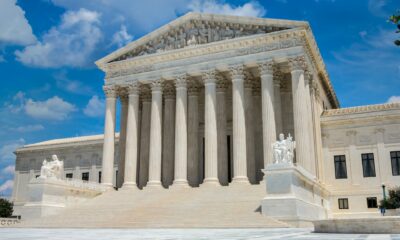Featured
January 1, FBI Desperately Trying to Hide Info on Slain DNC Staffer

ON THIS DAY IN HISTORY…
1845: First nationally observed uniform election day in the United States, the first Tuesday after the first Monday in November.
A federal judge ordered the FBI to release information from slain Democratic National Committee (DNC) staffer Seth Rich’s laptop, but the bureau seems to be trying everything within its power to prevent that from happening.
In an Oct. 27 court filing, the FBI asked the court to reverse its September order. If the court denies that request, the bureau wants to “review and process” the contents from Rich’s laptop at a staggering-slow rate of 500 pages per month.
The FBI alleged that the pertinent data consists of “approximately 400,000 pages, plus images and videos.” At a rate of 500 pages per month, it would take the bureau 66 years to process all of the relevant records.
Who is Seth Rich?
Seth Rich, 27, was a voter expansion data director at the DNC who was murdered at approximately 4:20 a.m. on July 10, 2016, in Washington, D.C.
Police said a botched robbery attempt led to Rich’s murder. Brad Bauman, a spokesperson for Rich’s family, previously told The New York Times that his watch strap was damaged, but his wallet and other belongings were still on him.
According to the Washington Post, Rich’s family said police had informed them that a convenience store security camera across the street captured a grainy image of Seth Rich collapsing and the feet or legs of two other people, potentially his assailants.
Multiple reports indicated that the 27-year-old DNC staffer was shot twice in the back.
Aaron Rich, Seth’s brother, said that emergency responders were “very surprised” he didn’t survive, adding that he was “very aware, very talkative.”
Not long after Rich’s death, rumors emerged that the killing was potentially politically motivated, and that he had possibly been involved in leaking internal DNC emails.
FBI accused of cover-up, “hiding documents”
On Sep. 1, 2017, attorney Ty Clevenger submitted Freedom of Information Act (FOIA) request to the FBI “seeking to obtain information on Seth Rich’s involvement in the DNC e-mail leaks,” according to court documents.
Clevenger’s FOIA request “included, but was not limited to, any records or correspondence resulting from any investigation of [Seth Rich’s] murder.”
In a letter dated Sep. 19, 2017, the FBI responded to Clevenger’s request. The bureau had conducted a search of its central database, but they “were unable to identify main file records responsive to the FOIA,” FBI Section Chief David Hardy wrote.
In Jan. 2020, an exasperated Clevenger said that the “FBI is hiding documents about murdered Democratic National Committee employee Seth Rich,” adding that he “requested a criminal investigation into the cover-up.”
Legal actions that followed produced evidence that the FBI did, in fact, have records pertaining to Rich.
“After three years of claiming that it could not find any records about murdered Democratic National Committee employee Seth Rich, the FBI admitted today that it has thousands of pages of information about him, further admitting that it has custody of his laptop,” Clevenger said.
Later, the FBI claimed that “the compact disc containing images of Seth Rich’s personal computer was provided to the FBI by a local law enforcement agency.”
In September, U.S. District Judge Amos Mazzant, ruled that the FBI must produce information from Rich’s laptop to Clevenger’s client, Brian Huddleston, finding that the “FBI improperly withheld this information under FOIA.”
Mazzant noted that had “it not been for Huddleston’s persistence, it is likely that the Government’s failure to locate over 20,000 pages of potentially responsive records would have gone unnoticed.”
Huddleston has finally been granted the right to review the documents, but the FBI wants 66 years to produce and review the material.
“After dealing with the FBI for five years, I now assume that the FBI is lying to me unless and until it proves otherwise. The FBI is desperately trying to hide records about Seth Rich, and that begs the question of why,” Clevenger told The Epoch Times.
WikiLeaks theory emerges
A prominent rumor that emerged in the wake of Rich’s death suggested that he was involved in providing the internal DNC emails that WikiLeaks published. The leaked emails appeared to reveal that the DNC had conspired with the Hillary Clinton campaign against Sen. Bernie Sanders.
The theory centered around Rich allegedly being a disgruntled Sanders supporter who had “secretly stolen thousands of emails and given them to Wikileaks to try to stop Hillary Clinton from winning the the presidency” and that “Clinton and the Democrats had arranged his killing,” according to NPR.
WikiLeaks founder Julian Assange’s interview with the Dutch television program Nieuwsuur bolstered the theory.
“Whistleblowers go to significant efforts to get [Wikileaks] material and often very significant risks. As a 27-year-old that works for the DNC who was shot in the back, murdered, just a few weeks ago for unknown reasons as he was walking down the street in Washington,” Assange said. He added that “our sources take risks and they become concerned to see things occurring like that.”
When the interviewer suggested that the killing was the result of a botched robbery, Assange replied, “No.”
A few weeks after Assange’s remarks, WikiLeaks issued a $20,000 reward for “information leading to conviction for the murder of DNC staffer Seth Rich.”
Vox denounced the rumors as “intense right-wing conspiracy theories.” The Blaze noted that Rich’s family condemned proponents of the WikiLeaks theory, even suing in some instances.
In 2019, former FBI Director Robert Mueller’s special counsel claimed that the Russian government was responsible for leaking the emails, and that Rich hadn’t been involved — which the WikiLeaks founder emphatically denied.
Assange consistently denied that Russia was behind the leaks, maintaining that it had been an “inside job.”
In May 2017, The New York Times reported that Rod Wheeler, a former police detective-turned private investigator hired by Rich’s family, claimed there was “tangible evidence” that Rich had been in contact with WikiLeaks before his death.
But Wheeler quickly walked back that claim, telling CNN that he had “no evidence” Rich had communicated with WikiLeaks.
Source: Blaze Media

-

 Entertainment2 years ago
Entertainment2 years agoWhoopi Goldberg’s “Wildly Inappropriate” Commentary Forces “The View” into Unscheduled Commercial Break
-

 Entertainment1 year ago
Entertainment1 year ago‘He’s A Pr*ck And F*cking Hates Republicans’: Megyn Kelly Goes Off on Don Lemon
-

 Featured2 years ago
Featured2 years agoUS Advises Citizens to Leave This Country ASAP
-

 Featured2 years ago
Featured2 years agoBenghazi Hero: Hillary Clinton is “One of the Most Disgusting Humans on Earth”
-

 Entertainment1 year ago
Entertainment1 year agoComedy Mourns Legend Richard Lewis: A Heartfelt Farewell
-

 Featured2 years ago
Featured2 years agoFox News Calls Security on Donald Trump Jr. at GOP Debate [Video]
-

 Latest News1 year ago
Latest News1 year agoNude Woman Wields Spiked Club in Daylight Venice Beach Brawl
-

 Latest News1 year ago
Latest News1 year agoSupreme Court Gift: Trump’s Trial Delayed, Election Interference Allegations Linger
Gregory Duda
November 4, 2022 at 6:59 am
Welcome to Amerika!! DUDA
Don
November 4, 2022 at 10:47 am
The FBI is as compromised as the rest of our government.
VON
November 4, 2022 at 1:17 pm
FBI, CIA, DOJ, DEMS/RINOS ALL HAVE A LOT OF CORRUPTION THAT IS RUNNING WILD………CAN’T WAIT TILL WE GET THEM OUT OF OUR WHITE HOUSE……….